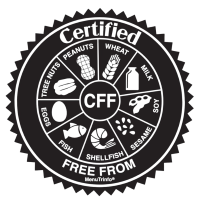[ad_1]
FORT COLLINS, COLO. — MenuTrinfo, a food safety training and auditing company, has developed an allergen-free certification process and seal to aid the more than 33 million consumers with life-threatening food allergies in the United States. The company’s program, trademarked as Certified Free From (CFF), serves as a third-party evaluation for manufacturers to verify products do not contain any or all of the nine major allergens.
“When we developed the Certified Free From program, the goal was to create a seal that consumers could seek out and know that they were getting something safe to eat,” said Claire Peacock, chief operating officer at MenuTrinfo, in a July 27 webinar.
CFF began in 2017 as an allergen verification service for foodservice providers in university dining halls but quickly grew to encompass consumer packaged goods. Now, the certification process holds an ISO 17065 accreditation from the American National Stands Institute (ANSI) National Accreditation Board, and the CFF seal may be found on over 400 stock-keeping units across the country.
“The CFF seal delivers confidence to the consumer through our internationally accredited standards and scheme certification,” said Betsy Craig, president and chief executive officer of MenuTrinfo. “We believe it is time to treat the food allergic community with the same transparency, respect and solution as we do those that need a gluten-free option.”
 The Certified Free From packaging seal. Photo: MenuTrinfo
The Certified Free From packaging seal. Photo: MenuTrinfo
The audit program, which checks for potential allergens from ingredient sourcing to packaging and storage, was designed in part due to the lack of clear regulations from the Food and Drug Administration surrounding allergen labeling. While companies are required by law to identify any major allergen ingredients and their sources, manufacturers are currently able to include unverified soft claims, such as “dairy-free” or “made in a peanut-free facility,” which leave consumers having to rely on the on the company’s word, according to Ms. Peacock.
Another concern comes from manufacturers using precautionary labeling to avoid facing potential liability or a recall for undeclared allergens, the No. 1 reason for food recalls in 2022, which accounted for just over 40% of cases. The statements included in this voluntary labeling practice, like “may contain” or “produced in a facility with,” are not verified for accuracy by the FDA.
With the CFF seal, the company is aiming for its certification to eliminate allergen labeling confusion and become a clear indicator for consumers.
“All of this really boils down to improving customer confidence when it comes to allergen-free claims,” Ms. Peacock said.
Regulators’ attention on allergens is growing, however, with the FDA officially naming sesame as the ninth major allergen in January 2023. The policy change resulted in manufacturers needing to take new steps to prevent sesame cross-contamination, and sesame was incorporated into CFF’s existing certification process.
The FDA also released new potential guidelines concerning allergen procedures and labeling on May 27 of this year.
“The FDA came out with a new draft compliance policy guide on allergen labeling and prevention of cross contact, and they’re getting public comment,” said Mike Flot, onsite client relations specialist at MenuTrinfo. “They’re focusing on it now.”
[ad_2]
Source link
